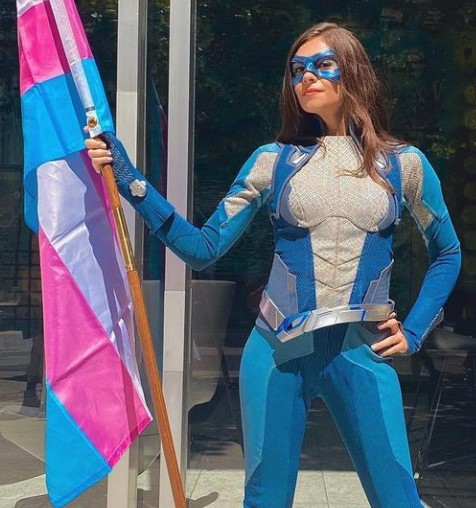A chairdre! It’s time to get into the second essay in Transgender Marxism
The PDF is here: https://transreads.org/wp-content/uploads/2021/07/2021-07-15_60f0b3d5edcb7_jules-joanne-gleeson-transgender-marxism-1.pdf
If you missed the intro discussion: https://lemmygrad.ml/post/395378
Now we’re moving on to the second essay, Trans Work: Employment Trajectories, Labour Discipline and Gender Freedom by Michelle O’Brien
Michelle Esther O’Brien is a militant and practicing psychoanalyst living in New York City. She recently graduated from New York University, with a doctoral thesis addressing how political economy and class politics shape LGBTQ organising in post-austerity NYC. Michelle is a co-editor of Pinko magazine, and was previously a social worker in HIV and AIDS services, and the long-time coordinator of the NYC Trans Oral History Project. She is a queer, a mom, and a communist.
As always, I’ll be pulling quotes and making notes.
Feel free to join in the discussion, or just read along and hopefully we all can learn a little something <3
Edit: the discussion continues with the next essay by Rosa Lee here: https://lemmygrad.ml/post/401480


“44% of African-American trans women reported experiences in sex work”
This is why I don’t think cis men who have never done sex work should be involved in conversations about sex work. Every time that discussion comes up (here and elsewhere) we get an awful lot of opinions from people who aren’t even affected by this. It’s paternalistic as shit.
I will get riled up about this topic, even though I tried very hard to say very little in the thread earlier because it gets so tiring to have some dude who read an article or two and now thinks they need to dominate conversations on the topic. Until you’ve actually done survival sex work maybe you can sit back and listen and let other people have these very difficult talks.
There are Marxists already with actual lived experiences who have things to say about this, so you don’t even have to worry that there’s no socialist voices involved.
“No law protects trans people against discrimination in 34 American states.”
Note to self: check up on this figure as well, I wonder if this number’s still accurate. There’s been a lot of anti-trans legislation recently (and also maybe some states passed trans protection laws?? I can hope. . .)
“A majority of American employers can openly fire someone on the basis of them being trans.”
A majority of employers can fire someone for pretty much any reason (or none), of course, but trans people are usually the first to go, and it almost never has anything to do with job performance.
“Communists and Marxists have long recognised that the kinds of work we do shapes not only the kind of misery we face, but also how we are able to organise. Workplaces determine where we are able to exert power through disruption, and the kinds of relationships of support and solidarity we are able to build with each other. How we work shapes how we can engage in class struggle.”
This exclusion of trans people (who by their very nature are predisposed to radicalisation against capitalism and class hierarchy) also excludes trans people from a large portion of organisation.
“These cases are all trans women of colour who are relatively out as trans or gender non-binary in their work; all faced discrimination and anguish in their work – but the differences in their stories reveal a lot about trans work trajectories.”
So now we’re going to look at three separate trajectory cases of openly trans women of colour and their experiences in the workplace.
The first case is Naomi. She grew up with money, had an education, learned to code, and ended up a professor at NYU teaching about game development.
“Despite her elite education, Naomi saw herself as needing to be willing to entirely sacrifice her class-standing and professional future in order to transition, basing this assessment on the horrors many other middle-class trans women faced in their professional fields”
Naomi feared coming out would destroy her ability to get a job, because Naomi didn’t look at the world through an intersectional lens. Naomi didn’t realize that being trans wouldn’t completely obliterate all the other ways in which her class relations gave her a leg up in society.
“Naomi not only reflected this trajectory, but did much to help create it – through Strap-On, through supporting the many queer and trans women who entered game design, and through the online battles over gender and sexuality within gaming that came to be known as ‘Gamergate’.”
Naomi was a pioneer in the “trans in tech” movement that is so popular amongst white (and Asian American) trans women. Fortunately for Naomi, girls in gaming is a great place for educated trans women to participate in society. Unfortunately for Naomi, g*mers exist.
“Like many other professional trans women working in tech, Naomi’s relative economic stability did not lead her into political conservatism. Instead, she was radicalised in these online networks, and continues to be very politically active. Naomi’s life and work helped open the space for the hundreds of trans women turning to communist politics and queer theory on social media today.”
Good for you Naomi!
The intersection of womanhood (a vector of oppression), gender-nonconformity (a vector of oppression) and being Asian American (a vector of oppression) means that despite Naomi’s relatively privileged place in society, she is still susceptible (through her vectors of oppression) to being marginalized and thus radicalized. This is why intersectionality is such an important piece of understanding class hierarchy and class struggle.
Many people in Naomi’s position who do not experience those same vectors of oppression are less likely to radicalize, as their class interests will more closely align with the capitalist class. That’s why, for instance, we see so many techbro libertarians.
“Many working-class trans New Yorkers are able to find wage labour jobs in retail and customer service. The attention to fashion and style that circulates in many communities of trans and queer people of colour makes them appealing as sales floor staff at apparel retail stores. In gay neighbourhoods many young trans people work as baristas, in bars, or as waiting staff”
Hmmm, this is pretty cool for New York, but holds less true in less “liberal progressive” urban centres. The farther from “liberal progressive” you get, the more your “appeal” as fashionable dissipates, and the less retailers will hire you (though there are certain retailers that are more likely to hire you, especially ones known for being “queer” or “edgy” like Spencer’s Gifts, or goth/punk adjacent fashion boutiques.)
It’s also important to remember that a trans woman’s appeal as “fashionable” and “stylish” is directly related to her ability to “pass,” her perceived sexual attractiveness, and the amount of money she has to spend on cultivating an aesthetic.
By the end of 2021, at least 130 bills had been introduced in 33 states to restrict the rights of transgender people.
In 2022, over 230 anti-transgender bills were introduced in state legislatures in a coordinated national campaign to target transgender rights.
Yeah, so unsurprisingly more bleak than the time of publishing.